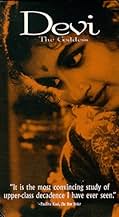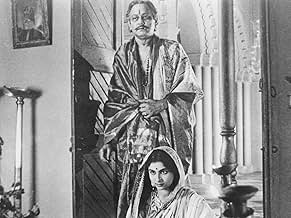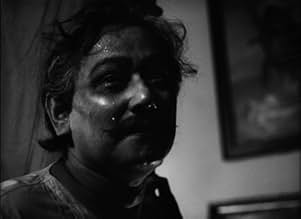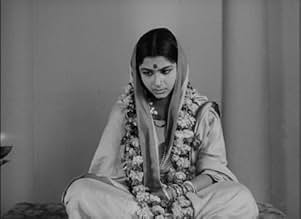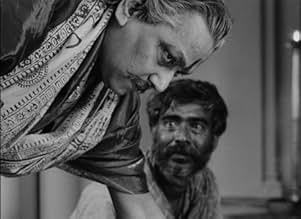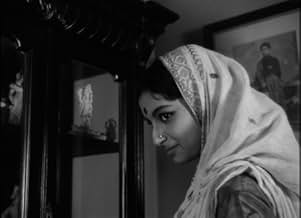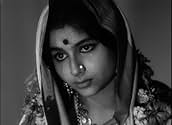AVALIAÇÃO DA IMDb
7,7/10
3,1 mil
SUA AVALIAÇÃO
Adicionar um enredo no seu idiomaA young woman is deemed a goddess when her father-in-law, a rich feudal land-lord, has a dream envisioning her as an avatar of Kali.A young woman is deemed a goddess when her father-in-law, a rich feudal land-lord, has a dream envisioning her as an avatar of Kali.A young woman is deemed a goddess when her father-in-law, a rich feudal land-lord, has a dream envisioning her as an avatar of Kali.
- Direção
- Roteiristas
- Artistas
- Prêmios
- 1 vitória e 1 indicação no total
Soumitra Chatterjee
- Umaprasad
- (as Soumitra Chattopadhyay)
Karuna Bannerjee
- Harasundari
- (as Karuna Bandyopadhyay)
Purnendu Mukherjee
- Taraprasad
- (as Purnendu Mukhopadhyay)
Arpan Chowdhury
- Khoka - Child
- (as Shriman Arpan Chowdhury)
Anil Chatterjee
- Bhudeb
- (as Anil Chattopadhyay)
- Direção
- Roteiristas
- Elenco e equipe completos
- Produção, bilheteria e muito mais no IMDbPro
Avaliações em destaque
After watching Satyajit Ray's The Apu Trilogy (1955-1959), which are now my favourite films of all time, I was looking forward to watching Devi, the next film Ray directed after The Apu Trilogy. Although I couldn't feel the same kind of emotional connection with the characters in Devi that I felt in The Apu Trilogy, this film was thought-provoking and very intriguing to watch.
Devi dealt with a serious issue in Bengali society at the time in a mature manner and Ray's direction and cinematography for this film was just as superb as The Apu Trilogy. It starred Soumitra Chatterjee and Sharmila Tagore once again as a married couple, like in Apur Sansar (the final part of The Apu Trilogy). However, whereas it was Soumitra who played the lead role in Apur Sansar, this time it's Sharmila who plays the lead role in Devi. Her performance was very subtle for the first half but her delusional performance towards the end was very convincing. Overall, I'd highly recommend this movie to any Satyajit Ray fan.
8/10
Devi dealt with a serious issue in Bengali society at the time in a mature manner and Ray's direction and cinematography for this film was just as superb as The Apu Trilogy. It starred Soumitra Chatterjee and Sharmila Tagore once again as a married couple, like in Apur Sansar (the final part of The Apu Trilogy). However, whereas it was Soumitra who played the lead role in Apur Sansar, this time it's Sharmila who plays the lead role in Devi. Her performance was very subtle for the first half but her delusional performance towards the end was very convincing. Overall, I'd highly recommend this movie to any Satyajit Ray fan.
8/10
"Devi" (Hindi, 1960): Directed by Satyajit Ray, and banned in India until the intercession of Nehru, this is the story of a lovely 17 year old wife, who is suddenly labeled as a "Goddess" (while her husband is absent to complete his final exams in college), due to a dream ("vision") by her father-in-law. What follows is a fascinating, multi-angled look at the transitional Indian culture (and MOST cultures, frankly). Is this any different, any worse, or any more desperate than seeing the face of Jesus in a grilled cheese sandwich or the grain of a wooden door? Is her overnight change in status unique? Are the people who have confused motives, hopelessness, or malleable minds any less vulnerable here and now? The quality of the video copy I viewed was rough a copy of a copy of a copy yet even then, the power of Ray's vision shines through. This is a serious, beautiful, insightful, tragic film. (It has something of a "cousins" relationship to the film "Anchoress".)
In the countryside of India, Umaprasad (Soumitra Chattopadhyay) has been happily married with his seventeen year-old wife Doyamoyee (Sharmila Tagore) for three years. They live in the house of Umaprasad´s father Kalikinkar Roy (Chhabi Biswas), who worships the goddess Kali, with Umaprasad´s elder brother Taraprasad (Purnendu Mukhopadhyay), his wife Harasundari (Karuna Bandyopadhyay) and their child Khoka. Umaprasad has a conversation with Doyamoyee and explains that he will move to the big city to study English and she questions why he needs to travel to go to school. Sometime later, Kalikinkar has a dream that Doyamoyee is the reincarnation of Kali and the locals come to Kalikinkar´s house to worship her. Doyamoyee asks Harasundari to write to Umaprasad and soon he returns home. But Doyamoyee has been brainwashed with the situation and begins to believe that she might be the reincarnation of Kali leading the family to a tragedy.
"Devi", a.k.a. "The Goddess", is a little gem with a story of family tradition (and respect), religion, superstition and ignorance in the Nineteenth Century in India. "Devi" is beautifully shot in black-and-white and has magnificent performances and a perfect open conclusion. My vote is eight.
Title (Brazil): "A Deusa" ("The Goddess")
"Devi", a.k.a. "The Goddess", is a little gem with a story of family tradition (and respect), religion, superstition and ignorance in the Nineteenth Century in India. "Devi" is beautifully shot in black-and-white and has magnificent performances and a perfect open conclusion. My vote is eight.
Title (Brazil): "A Deusa" ("The Goddess")
Being a Bengali, I had the privilege to read the original story by Prabhat Kumar from which the screenplay was adapted, and the story had a concrete conclusion with a deep impact where Ray finished it with surrealism and abstraction. Mostly he avoided the actual ending to bypass the social stigma which prevailed at that time. Also the story provides a very intimate adoration between the lead couple which was also avoided for probably the same reason.
Apart from that it possesses all the characteristics of Ray's direction with thrilling music, cinematography and screenplay. Definitely a must watch.
Apart from that it possesses all the characteristics of Ray's direction with thrilling music, cinematography and screenplay. Definitely a must watch.
A film that explores the line between the good aspects of faith (e.g. humility) and the bad (e.g. ignorance) when an elderly man has a dream that his daughter-in-law is the incarnation of the goddess Kali, and immediately begins venerating her. In Hinduism the idea of one of the deities from its pantheon incarnating as a mortal is fairly common and has some interesting and profound philosophical implications, but here we feel a deep sense of falseness and unease. When the young woman's husband returns to find her on a dais surrounded by chanting worshippers he eventually tries to get her out of there, but she begins to wonder whether she might indeed be Kali, and if leaving may cause the gods to inflict their wrath upon him. It all seems a little crazy - a single fleeting moment in an old man's dream, and suddenly streams of people are coming to a trapped young woman, some bearing sick children and expecting her to heal them.
Before the dream, the old man has a somewhat creepy relationship with her - for example, calling her 'mother' and praising her while she waits on him and tenderly washes his feet. Later we find out she's just 17 years old, and has been married for 3 years, causing some uncomfortable internal math even if it is based on the reality of 19th century India (and apparently a true story). Sharmila Tagore plays the conflicted aspects of the part well, and she was only 16 years old. I found that the film was an interesting look into the culture - and director Satyajit Ray's criticism of blind faith - but the pace of the film was a little too slow for what is a pretty simple story. It finishes strong though, and with some powerful images of Tagore.
Before the dream, the old man has a somewhat creepy relationship with her - for example, calling her 'mother' and praising her while she waits on him and tenderly washes his feet. Later we find out she's just 17 years old, and has been married for 3 years, causing some uncomfortable internal math even if it is based on the reality of 19th century India (and apparently a true story). Sharmila Tagore plays the conflicted aspects of the part well, and she was only 16 years old. I found that the film was an interesting look into the culture - and director Satyajit Ray's criticism of blind faith - but the pace of the film was a little too slow for what is a pretty simple story. It finishes strong though, and with some powerful images of Tagore.
Você sabia?
- CuriosidadesSharmila Tagore was just 15 when she filmed this role.
- Citações
Kalikinkar Roy: [while Doyamoyee strokes his feet] Do you know who I'm worried about? I'm worried about your Christian husband. You never know the intention of boys today.
- ConexõesFeatured in A História do Cinema: Uma Odisseia: Sex & Melodrama (2011)
Principais escolhas
Faça login para avaliar e ver a lista de recomendações personalizadas
- How long is The Goddess?Fornecido pela Alexa
Detalhes
Bilheteria
- Faturamento bruto nos EUA e Canadá
- US$ 93.215
- Tempo de duração1 hora 33 minutos
- Cor
- Mixagem de som
- Proporção
- 1.37 : 1
Contribua para esta página
Sugerir uma alteração ou adicionar conteúdo ausente



